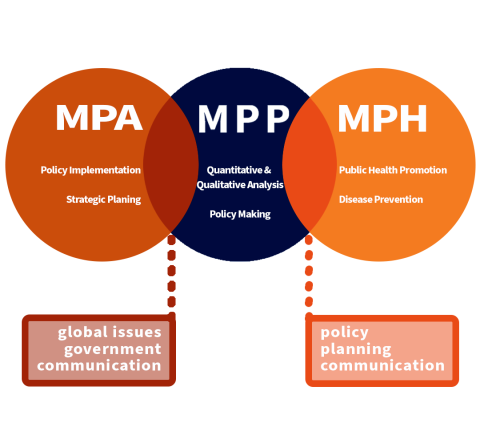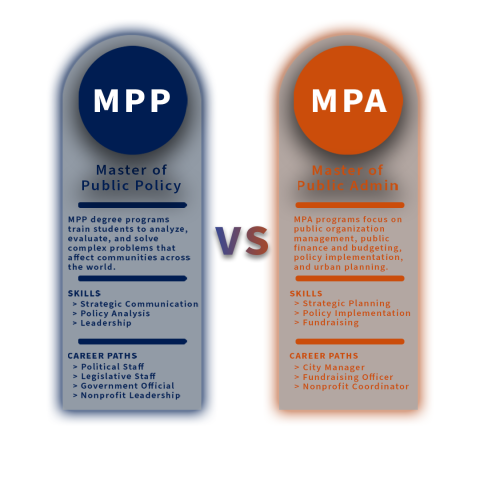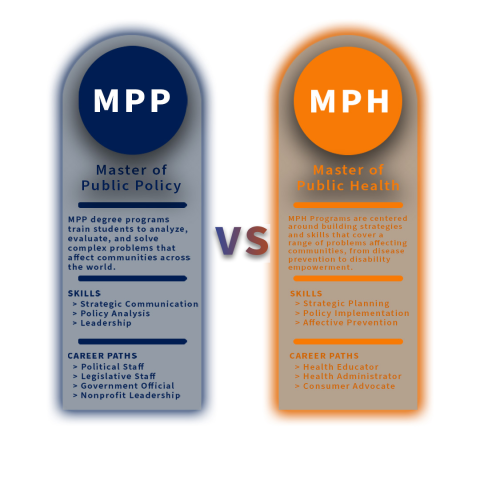Master in Public Policy vs. Master of Public Administration & Master of Public Health

If you are considering a master’s degree, recognizing the similarities and differences between public service degree programs is crucial when weighing the opportunities. Some of the most recognized service degrees – the Master in Public Policy (MPP), the Master in Public Administration (MPA), and the Master in Public Health (MPH) – focus on preparing students to take on leadership roles in public, private, nonprofit, and for-profit organizations, across a range of industries and fields. Despite the basic similarities, the curriculum delivered to students and the careers they are prepared for can vary greatly. These differences, and similarities, are outlined below.
Masters in Public Policy
A Public Policy Master’s degree program examines economic and political factors that affect and decide policy formation. Public Policy is what “government (any public official who influences or determines public policy, including school officials, city council members, county supervisors, etc.) does or does not do about a problem that comes before them for consideration and possible action.”
In-depth study of these issues and real-world applications train students to analyze, evaluate, and solve complex problems that affect communities across the world. MPP curriculum often incorporates qualitative and quantitative data to allow students to develop the high-level skills needed to pursue the areas of policy that their passions lie in.
Master in Public Policy vs Master of Public Administration

When it comes to pursuing a career in government, local or federal, students have two significant options: an MPP degree or an MPA. Both programs focus on introducing students to global issues from economic, environmental, and international factors with the goal of strategic implementation and communication across the board.
While they are similar, they have big differences.
Aimed at students passionate about advocacy, fundraising, planning, and leadership, MPA programs are centered around concepts such as public organization management, public finance and budgeting, policy implementation, and urban planning. Whereas MPP programs prepare students to analyze, evaluate, and construct policies that are the framework for society. MPA graduates tend to be more qualified for public management, nonprofit leadership, and local government roles. Examples of MPA careers include: City Manager, Fundraising Officer, Nonprofit Coordinator, etc.
Master in Public Policy vs Master of Public Health

An MPH program and an MPP program both share pillars of policy and theoretical exploration. The question to consider when choosing between an MPP degree and an MPH degree is do your passions lie on the ground floor or behind the scenes of key public health sectors?
While they are similar, they have big differences.
MPH degree programs are constructed for individuals striving to promote and prevent in the context of public health. These programs are centered around building strategies and skills that cover a range of problems affecting communities, from disease prevention to disability empowerment. MPP graduates possess the skills to create and analyze policies across these sectors. MPH graduates are more prepared for administrative roles on the ground floor across public health sectors. Examples of MPH careers include: Health Educator, Hospital Administrator, Consumer Advocate, etc.
Why Get a Master’s Degree in Public Policy?
A master’s degree offers the tools you need to make a difference and create change in the complex landscape of 21st century policymaking. At the Carsey School of Public Policy you will learn how to develop sustainable approaches to societal problems and how to communicate strategically through real-world applications, deep policy connections, and a world-class curriculum.
At Carsey, you will create a personalized master’s degree based on your passions and graduate with the skill set that policy professionals need to succeed. Our built-in experiential learning opportunities are designed to deepen and broaden your education and network. These opportunities include meeting key policy makers at all levels of government throughout your time on campus and during our Washington, D.C., colloquium. Gain real-world experience through a policy internship and capstone project centered around your community.
What Can I Do with a Master’s Degree in Public Policy?
Career paths for Public Policy graduates vary from those listed above. With the pinpoint on policy analysis and strategic communication, examples of MPP careers include:
-
Policy Leadership
-
Policy Advocate
-
Political Staff
-
Legislative staff
-
Sustainability manager
-
Community outreach partner
-
Government affair official
-
Non-profit leader
-
Government official
As you can see the similarities between these programs can make choosing your master’s degree very difficult. However, while they are similar, they have big differences. Each program has its distinguishing qualities and offers a range of career options. While policy implementation blankets each of these paths, a Master in Public Policy works to analyze, evaluate, and solve complex problems that span each of these sectors. With full-time, part-time, and accelerated options, the Carsey School’s MPP program fits students from all different backgrounds, from career professionals to current undergraduates.
FAQs
The Master in Public Policy program at the Carsey School of Public Policy is designed to build critical thinking and analytical expertise and strategic communication skills while connecting students to policy makers and advocates working inside and outside of Washington, D.C. A key component of the program is the D.C. Colloquium, during which students meet with key policymakers in Congress, the White House, government agencies, and advocacy groups.
Another key component of the MPP degree is the degree track option. Select from a Strategy and Communication track, with an emphasis on communicating with media, negotiation, and lobbying and the legislative process, or a Policy Analysis track. In the latter, you can focus on Research Design and Evaluation, Advanced Statistics and Data Analysis, and/or Survey Research and Public Opinion and prepare for a career as a policy researcher, data analyst, or evaluation researcher.
With this specialized policy degree program, you’ll come away equipped for such roles as Communications professional, Policy Advocate, Community Outreach partner, Government affairs manager, Sustainability manager, Political scientist, or Elected official.
The difference in salaries between a graduate with an MPA versus an MPP depends on many factors: years of career experience; region of employment; and, most importantly, career field or job. For example, according to the Bureau of Labor Statistics, Social and Community Service Managers make a media of $69,600 per year while Political Scientists make a media salary of $125,350 per year. Below are some additional possible MPA and MPP career paths with BLS salary information.
- Administrative Services and Facilities Managers – Median Pay: $98,890 per year
- Human Resources Managers – Median Pay: $121,220 per year
- Public Relations and Fundraising Managers – Median Pay: $118,430 per year
- Survey Researchers – Median Pay: $59,870 per year
- Labor Relations Specialist – Median Pay: $73,240 per year
- Legislators – Median Pay: $53,560 per year
- Compensation and Benefits Managers – Median Pay: $125,130 per year
- General and Operations Managers – Median Pay: $125,740 per year
